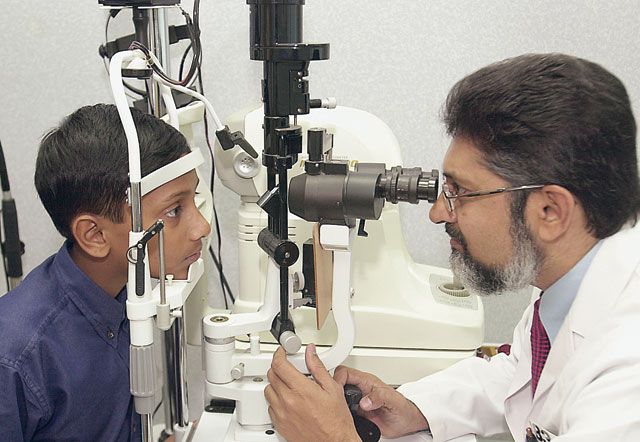Abu Dhabi: Almost 10 per cent of diabetics are at risk of ending up with a severe form of visual impairment which can lead to blindness if they do not undergo regular screening tests.
Since eye problems are amongst the most common complications of diabetes, patients require routine eye examinations to promote early detection, said Dr Chris Canning, consultant vitreo-retinal surgeon and medical director, Moorfields Eye Hospital Dubai, during the Moorfields Retinal Masterclass held at the Imperial College London Diabetes Centre (ICLDC) Abu Dhabi.
"Almost everyone will have some form of eye disease after 20 years of diabetes. That's why we're trying to introduce a national screening initiative in the UAE that involves a digital photograph of the retina, which can be done through mobile vans that can travel from one centre to another," Dr Canning told Gulf News.
Common symptoms
With the UAE second on the list of countries worldwide hit by diabetes (with the incidence of the disease ranging from 20 to 33 per cent), ophthalmologists warn patients that they are likely to develop eye problems such as cataract, glaucoma and diabetic retinopathy (damage to the retina), which is the main threat to vision.
The effect of diabetic retinopathy on vision varies depending on the stage of the disease. Common symptoms of diabetic retinopathy include blurred vision (this is often linked to blood sugar levels), floaters and flashes and sudden loss of vision.
"It's important to note that almost every uncontrolled diabetic patient will have some form of eye disease in their lives, the majority start mild, however you can modify the course of eye care using laser, surgery or a variety of interventions." said Dr Canning. He described eye screening for diabetics as a pyramid that starts off with primary care — the basis of screening; secondary care — involving diagnoses and injections, and tertiary care — which involves an eye surgery if necessary.
"If diabetics follow that pyramid and get regularly screened, they will find cost-effective results and can avoid blindness," said the expert ophthalmologist.
The exact percentage of diabetics in the UAE being screened for visual impairment remains unknown according to said Dr Maha Taysir Barakat, medical and research director and consultant endocrinologist, ICLDC. "The exact percentage is unknown, but assuming only half of the current 20 per cent of adults in the UAE with diabetes actually know that they have it, I would suspect well under half of the 20 per cent will be receiving yearly screening," said Dr Barakat, who also added that the number of visually impaired diabetics across the UAE is still not known either.
Dr Bill Aylward, medical director and senior vitreo-retinal surgeon at Moorfields Eye Hospital and president of Euretina, explained to Gulf News why the eye along with other organs such as the heart and kidney are particularly sensitive in the case of diabetics. "Each bit of the retina has one blood vessel supply which cannot be replaced. If for example you lose a blood vessel in your finger it doesn't matter because you have many others that can replace it," he said.
The abnormal growth of tiny blood vessels in the eye and the associated complication of bleeding is one of the most common problems treated by surgeons. Laser surgery is usually the treatment of choice for this problem.
Laser treatment when used at the right time can reduce visual loss by 50 per cent, Dr Canning explained.
According to Dr Aylward, 50 per cent of blind registrations in the UK were due to diabetes. "That number was a result of a lack of a formal eye screening programme available at the time, which the UK has now introduced," he said.
Diabetes patients who are able to maintain blood sugar levels at manageable levels have fewer eye problems than those with poor self-discipline. Adhering to recommended diets, cutting back on the level of fats in the blood, controlling blood pressure, stopping smoking and exercising play important roles in the overall health of those with diabetes.
Diabetics can also greatly reduce chances of eye complications by scheduling routine examinations with an ophthalmologist. Many associated problems can be treated with much greater success when detected early. "The reduced visual acuity in patients with diabetes is negatively associated with quality of life, and has been shown to affect general and mental health, social and physical functioning and energy levels," said Dr Maha Taysir Barakat, medical and research director and consultant endocrinologist at the Imperial College London Diabetes Centre Abu Dhabi.
Source: Oxford Centre for Diabetes, Endocrinology and Metabolism, Churchill Hospital, Oxford, UK
Lifestyle: Self-discipline the key to managing risks














